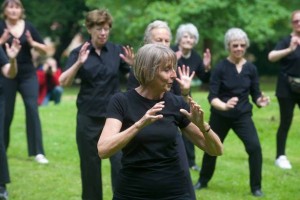
By John M. de Castro, Ph.D.
“Yoga is not just about the physical side, it’s also about the mind-body connection. I think having that awareness and accepting their condition can help them when they go out into the world, and lift up their self-esteem. Life is fast – yoga can help them be calm and still.” – Surang Sengsamran
HIV is a virus that gradually attacks the immune system. It destroys a type of white blood cell called a T-helper cell (CD4 Cell). This isn’t a problem unto itself, but the immune system is our body’s natural defense against illness. Hence, HIV infection makes it harder to combat other infections and diseases. If HIV is untreated, these secondary infections produce chronic illness and eventually death. It is important, then, in treating HIV infection to strengthen the immune system and increase the levels of CD4 in the blood to fight off disease.
More than 35 million people worldwide and 1.2 million people in the United States are living with HIV infection. In 1996, the advent of the protease inhibitor and the so-called cocktail changed the prognosis for HIV. Since this development a 20 year-old infected with HIV can now expect to live on average to age 69. Hence, living with HIV is a long-term reality for a very large group of people.
People living with HIV infection experience a wide array of physical and psychological symptoms which decrease their perceived quality of life. The symptoms include muscle aches, anxiety, depression, weakness, fear/worries, difficulty with concentration, concerns regarding the need to interact with a complex healthcare system, stigma, and the challenge to come to terms with a new identity as someone living with HIV. Hence, patients with HIV infection, even when controlled with drugs, have a reduction in their quality of life. There is thus a need to find methods to improve the quality of life in people who are living with HIV infection.
Mindfulness has been shown to strengthen the immune system. It also improve psychological and physical well-being in people suffering from a wide range of disorders including depression and anxiety. It has also been shown that mindfulness is associated with psychological well-being and lower depression in patients with HIV infection. Integrated Yoga is a contemplative practice that includes postures, breathing practices, relaxation techniques, and meditation. It has been shown to increase mindfulness, and reduce anxiety and depression. So, it would stand to reason that Integrated Yoga would be beneficial for people who are living with HIV infection.
In today’s Research News article “Effect of Integrated Yoga (IY) on psychological states and CD4 counts of HIV-1 infected patients: A randomized controlled pilot study”
http://www.ncbi.nlm.nih.gov/pmc/articles/PMC4728960/
Naoroibam and colleagues randomly assigned patients with HIV infection to either a one-hour per day, six-days per week Integrated Yoga practice for one-month or to a treatment as usual condition. Compared to before treatment and the control group, they found that the Integrated Yoga practice produced a significant reduction in anxiety and depression levels and an increase in T-helper cell (CD4 Cell) counts in the blood. It should be kept in mind that there was not an active control condition. So, it is unclear if the effectiveness of Integrated Yoga practice was due to exercise effects or perhaps to expectancy effects, researcher bias effects, etc. It will remain for future research to sort out exactly what is responsible to the improvement in the HIV patients.
Regardless, these are exciting and potentially important results suggesting that Integrated Yoga practice may not only improve the psychological well-being of HIV infected patients but also strengthen the immune system. This would make them better able to combat other infections and diseases.
So, improve psychological and physical effects of HIV with yoga.
“As you become more adept at yoga, you learn which poses can help you, depending on how you are feeling physically. There are certain poses that assist in relieving fatigue, diarrhea, anxiety, depression. You do learn about the nature of self, but you also learn that so much is beyond your control. It helps you realize, somehow, to trust in a higher being.” – Steve McCeney
CMCS – Center for Mindfulness and Contemplative Studies
This and other Contemplative Studies posts are available at the Contemplative Studies Blog http://contemplative-studies.org/wp/



